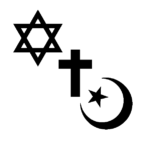Christopher Tollefsen’s criticism of the Live Action “sting operation” against Planned Parenthood, and his subsequent defense of the claim that deliberate falsehoods are intrinsically immoral (see here, here, and here), has set off a debate, largely among his conservative allies, on the ethics of truth-telling and the defense of innocent human life. This dispute could hardly fail to enlighten, given the eminence of the participants: Tollefsen himself, Robert George, Peter Kreeft, and Hadley Arkes, to name just a few. Nevertheless, I think that this important inquiry has not yet achieved the clarity that it ought, in part because Tollefsen’s critics have been too hard on him and too easy on themselves. Yet the maximum clarity should be sought, because the issue involves not only the question of truth-telling but also the larger question of the relationship of morality to politics and the political tenability of adherence to true exceptionless moral norms.
Many of Tollefsen’s critics frame their arguments in such a way as to suggest that his position is that of a moral fanatic. His condemnation of falsehood, they suggest, manifests a thirst for moral purity that is not only needless but morally irresponsible. This suggestion emerges most clearly, of course, in relation to the test case around which much of the argument has been conducted: the case of the person sheltering Jews from the Nazis, who must decide what to say to the investigating Gestapo agent.
It is true that Tollefsen denies the morality of a deliberate falsehood told even in these grave circumstances. Nevertheless, some of his critics imply that Tollefsen’s moral judgment on this question involves an unqualified moral condemnation of those who lie in these circumstances, and even that he thinks they would be worthy of punishment. In fact, Tollefsen’s condemnation falls precisely upon the act of deliberate falsehood. That act has the character, on Tollefsen’s view, of an immoral means chosen in pursuit of a most moral and noble end—and chosen, one might add, under the terrible pressures of life under a murderously totalitarian regime. There is nothing in such a judgment that would demand the punishment of the person who had lied in those circumstances. Indeed, there is nothing in such a judgment that would in any way preclude loading such rescuers with the greatest public honor—honoring them not for the lie to which they had wrongly but understandably succumbed, but for the goodness of their undertaking as a whole.
Tollefsen’s critics indict him as follows: he would not assert a falsehood even to save innocent lives. This framing of the argument suggests that it is open to the person in this horrible situation to save innocent lives by resorting to falsehood. But this is almost certainly a distortion—convenient to Tollefsen’s critics—of any real situation. The person who resorts to falsehood in such a case may hope to save innocent life, but he can have no assurance that he will do so, or that this expedient will work more effectively than others that do not require false assertion. If the Gestapo are at your door on a hunt for hidden Jews, they are very likely to search your home no matter what you say. The person who uses false speech in such a situation does what he knows to be ordinarily wrong. He does not and cannot know that his falsehood will save lives or that it will be more likely to save lives than some other response that does not require outright falsehood, such as artful but truthful misdirection or evasion.
Tollefsen’s critics also take a too-easy course in playing rhetorically to a gallery of observers that they think—probably rightly—will be predisposed to agree with them. Thus Peter Kreeft says not only that Live Action’s deeds were morally right, but that they were obviously morally right. This is as much to say that not only is Tollefsen wrong, but he is obviously wrong. Similarly, Arkes repeatedly turns to rhetorical questions—”could one honestly profess to believe . . .?” “do my friends really think . . . ?”—designed to imply that Tollefsen’s views are rather clearly beyond the pale of reason. These tactics give the impression that Kreeft and Arkes are appealing to the moral common sense of the human race. I do not doubt that they sincerely think that this is what they are doing. But it is really not so simple.
Start your day with Public Discourse
Sign up and get our daily essays sent straight to your inbox.One could restate the question as follows: “Are you seriously telling me that a gentleman would never lie?” If one posed that question in certain European cultures one thousand years ago, one would find not a few responses in the affirmative. Moreover, these affirmations would come not only from religious fanatics—monks in cloisters or hermits in the desert—but from worldly men, not the most earnest Christians, but men committed to a notion of gentlemanship bound up with absolute standards of conduct. And these men would be as puzzled at any doubt of the true gentleman’s unswerving disdain of falsehood as Arkes and Kreeft are at Tollefsen’s position.
To be sure, none of this shows that Tollefsen is right. It does show, however, that in their efforts to dismiss him out of hand Kreeft and Arkes are appealing not to the moral common sense of mankind as such, but to the moral sensibilities of a contemporary culture that is steeped in consequentialism and that therefore is already very predisposed to agree with them in this particular dispute. Here Tocqueville is most instructive. As he shows in Democracy in America, modern egalitarian societies are much inclined to a utilitarian, pragmatic morality. Such societies will tend to think it obvious that the destruction of innocent life is the greatest evil and that whatever seeks to avert it cannot be wrong. But Tocqueville also reminds us of an older, aristocratic morality—one held by men who were just as human as we modern democrats—according to which the greatest evil is willingly to violate certain standards of upright conduct, regardless of the consequences.
We would do well to consider the implications of the criticisms of Tollefsen. There is no doubting that Tollefsen’s critics are men of the utmost moral seriousness, and nothing can be more laudable than the efforts to save innocent life. Nevertheless, one who considers their arguments might well fear that they lead to a kind of well-intentioned but morally untethered Machiavellianism—the pursuit of morally good ends with no moral restraints on the means chosen. This concern arises first in relation to the ethical question immediately at hand. Of course it sounds humane and responsible to defend the telling of deliberate falsehoods to defend innocent life. But, one must wonder, where does it end? What is the principle of limitation here?
Hadley Arkes says that not every untruth is a lie, that the “untruth becomes a lie when it is directed to a wrongful purpose, as in deceiving for the sake of fraud and for the hurting of the victim.” We know that this means, for Arkes, that one may speak falsely in order to try to save the innocent. May we also speak falsely to prevent all lesser injustices, or to advance any worthy project that does not involve the hurting of the victim but that is really for his own good? Suppose the pro-life movement were one vote shy in the Congress of passing a bill that, by limiting abortion, would save innocent lives. Suppose further that there were a special election for the decisive seat, which happens to be in a liberal district or state. Should a clandestine pro-life candidate for that office falsely tell the voters that he is pro-choice and would never vote in favor of the pro-life bill, all the time intending to vote for it once elected? Can Arkes deny that a person who does such a thing, even in such a worthy cause, does something wrong and takes a kind of corruption into his soul?
This concern about the moral limits on the means we choose in pursuit of good ends, moreover, cannot be confined to the question of truth-telling, and one accordingly wonders whether some criticisms of Tollefsen sweep more broadly than their authors intend. Tollefsen belongs to a tradition of moral philosophy according to which there are some true exceptionless moral norms. This is also true, I believe, of his critics. Arkes says that “we don’t cast moral judgments solely on the basis of the gross description of the act,” but that we also take into account the surrounding circumstances. This is true, but if we believe in exceptionless moral norms then the act itself is always relevant and in some cases decisively relevant. On this view, there are some things, however few and narrowly defined, that one must never do. From this belief in exceptionless moral norms it would seem to follow that there are some things one should not do even to save the innocent. One wonders whether Tollefsen’s critics can accept this proposition.
Arkes concludes his response by contending that Tollefsen’s position on truth-telling is a form of moral and political irresponsibility that would disqualify him from occupying the presidency and taking charge of protecting his fellow citizens. After all, he points out, the infiltration of terrorist cells, necessary to protect American lives, almost certainly would require deliberate falsehoods that Tollefsen would regard as “intrinsically immoral.” Yet it is not hard to imagine that the infiltration of terrorist cells could also require other actions that would appear to violate exceptionless moral norms in the tradition to which both Tollefsen and his critics belong.
Getting inside a gang of terrorists might require entering into an illicit sexual relationship with one of them. It might well require participating in an act of rape or murder in order to demonstrate one’s genuine hatred for the movement’s enemies. Are such actions permissible? Do they lose their immoral character because they are done with a view to protecting the innocent? If so, is it really possible to speak of the inviolable integrity of the sexual act, or of the inviolability of every innocent person? Perhaps here as well it is appropriate to “call the question,” as Arkes insists.










